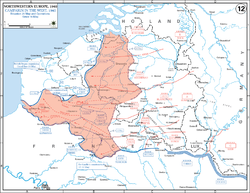
Back معركة أراس (1940) Arabic Schlacht von Arras (1940) German Batalo de Arras (1940) Esperanto Batalla de Arrás (1940) Spanish Arrasin taistelu (1940) Finnish Bataille d'Arras (1940) French Pertempuran Arras (1940) ID Battaglia di Arras (1940) Italian アラスの戦い (1940年) Japanese 아라스 전차전 Korean
| Battle of Arras | |||||||
|---|---|---|---|---|---|---|---|
| Part of the Battle of France in the Second World War | |||||||
 Situation in France, 21 May 1940. The counter-attack near Arras is seen the centre-left of the image. | |||||||
| |||||||
| Belligerents | |||||||
|
|
| ||||||
| Commanders and leaders | |||||||
| Harold Franklyn | Erwin Rommel | ||||||
| Units involved | |||||||
|
3e Division Légère Mécanique 5th Infantry Division 50th Motor Division 1st Army Tank Brigade |
SS Division Totenkopf 5th Panzer Division 7th Panzer Division | ||||||
| Strength | |||||||
|
88 tanks (Frankforce) 15,000 infantry |
c. 225 tanks 5,000–10,000 infantry | ||||||
| Casualties and losses | |||||||
|
60 tanks lost (Frankforce), including 2 Matilda II c. 500 British killed, wounded, and captured |
350 killed or wounded, 400 captured 7th Panzer Division lost 37 tanks | ||||||
| 80 Allied prisoners were murdered in the Wormhoudt massacre, by members of II Battalion, SS Infanterie-Regiment Leibstandarte SS Adolf Hitler | |||||||
The Battle of Arras took place on 21 May 1940, during the Battle of France in the Second World War. Following the German invasion of the Low Countries on 10 May, French and British forces advanced into Belgium. The German campaign plan Fall Gelb (Case Yellow) had evolved into a decoy operation in the Netherlands and Belgium, with the main effort through the Ardennes. German units crossed the Meuse without waiting for reinforcements at the Battle of Sedan. Instead of consolidating bridgeheads on the west bank of the Meuse, the Germans began an advance down the Somme river valley towards the English Channel.
The Allies were thrown into confusion and their attempts to cut off the panzer spearheads degenerated into sporadic, un-coordinated counter-attacks which never achieved sufficient concentration to succeed as the main Allied armies were in Belgium. The offensive at Arras was planned by the British and French to relieve the pressure on the British garrison in the town of Arras and was not coordinated with an attack by the French from the south of the German panzer corridor.
Constrained by the limited forces available to them, the Anglo-French offensive was carried out by a small mixed force of British and French tanks and infantry who advanced south from Arras. The Allies made some early gains and panicked a number of German units but after an advance of up to 6.2 mi (10 km), they were forced to withdraw after dark to avoid encirclement. The attack was a failure but had a disproportionate effect on Hitler and Oberkommando der Wehrmacht (OKW, German armed forces high command).
Concern about more Anglo-French counter-attacks against the panzer corridor before non-motorised German infantry divisions caught up, led Hitler to order the panzer advance to stop until the situation at Arras had been restored. The Allies used the pause to reinforce the Channel Ports, prevent their rapid capture and fortify the western approaches to Dunkirk before the Germans arrived, making the evacuation of the British and French forces in Operation Dynamo possible.
